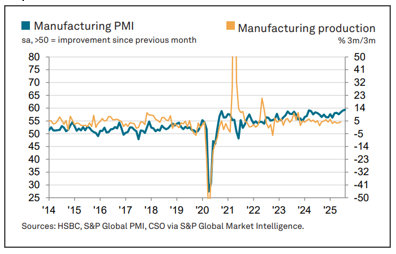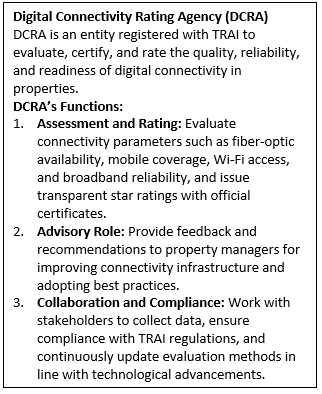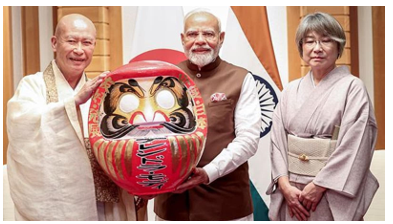Manufacturing Purchasing Managers’ Index (PMI)
Context: The Composite PMI recorded its fastest growth in 17 years in August 2025, highlighting a pick-up in growth of output across India’s manufacturing and services sectors.
More on the News
- The Hongkong and Shanghai Banking Corporation Limited (HSBC) India Composite PMI Output Index (combining manufacturing and services output) rose to 63.2 in August from 61.1 in July.
- The Manufacturing PMI rose to 59.3 in August from 59.1 in July, marking the fastest improvement in operating conditions since February 2008 on the back of strong domestic demand and increased production.
- Services PMI jumped to 62.9 in August from 60.5 in July, hitting a 15-year high in August on new orders and rising output led by international demand.
- Growth Drivers for Manufacturing:
- Strong domestic demand spurred production and new orders.
- Successful advertising campaigns supported order inflows.
- Input purchases by firms also rose at the fastest pace in 16 months.
- Growth Drivers for Services: Demand buoyancy, efficiency gains, and greater inflows of new business were among the key reasons for the strongest growth since 2010.
- Economic Context: This PMI acceleration coincided with India’s quarterly GDP growth of 8% in the first quarter (April–June 2025), substantially higher that expectations.

HSBC India Purchasing Managers’ Index (PMI)
- The Purchasing Managers’ Index (PMI) is an economic indicator based on monthly surveys of private sector companies.
- In India, it is compiled by S&P Global (formerly IHS Markit) for HSBC.
- The manufacturing PMI is calculated using five parameters: new orders, output, employment, suppliers’ delivery times, and inventory of purchases.
- Unlike manufacturing PMI, services PMI is not a weighted average of multiple components and hence it is calculated using a single parameter: the Services Business Activity Index.
- A reading above 50 indicates expansion, while below 50 signals contraction.
- Types of PMI in India include:
- Manufacturing PMI (around 400 firms surveyed).
- Services PMI (around 400 service companies surveyed).
- Composite PMI, a weighted average of manufacturing and services PMI
Digital Connectivity Rating Agencies (DCRAs)
Context: TRAI has registered eight agencies as Digital Connectivity Rating Agencies (DCRAs) to enhance in-building digital connectivity across India.
More on the News

- The registrations are valid for five years starting from 27 August 2025, under the provisions of the Rating of Properties for Digital Connectivity Regulations, 2024.
- The eight registered agencies are:
- Ardom Towergen Private Limited
- Crest Digitel Private Limited
- CTL Infocom Private Limited
- ESTEX Telecom Private Limited
- Frog Cellsat Limited
- Phistream Consulting Private Limited
- Shaurrya Teleservices Private Limited
- TUV SUD South Asia Private Limited
- The DCRAs will conduct connectivity assessments as per the Manual for Rating of Properties for Digital Connectivity.
- Based on the assessments, each property will be given a ‘Star Rating’ for digital connectivity.
- These ratings will help buyers, tenants, and businesses make informed decisions when choosing properties.
- The framework will also motivate real estate developers to strengthen in-building digital infrastructure.
- The methodology considers multiple parameters such as internet speed, network reliability, and availability of digital services, ensuring a comprehensive evaluation.
- A dedicated TRAI portal has been launched to provide public access to rating details and information about registered agencies.
Telecom Regulatory Authority of India
- TRAI was established in 1997 under the Telecom Regulatory Authority of India Act, 1997, to regulate telecom services in India.
- It ensures fair competition, consumer protection, and orderly growth of the telecom sector.
- It is headquartered in New Delhi.
Daruma Doll
Context: During his visit to Japan, the Prime Minister of India was presented with a Daruma doll by the Chief Priest of the Shorinzan Daruma-Ji temple, symbolising the deep-rooted cultural and spiritual ties between India and Japan.
Daruma Doll

- The Daruma doll is regarded as an auspicious symbol and a good luck charm in Japanese culture.
- It is a traditional Japanese wish doll, usually made of papier-mâché, and is modelled after Bodhidharma, the 5th-century founder of Zen Buddhism.
- The tradition originated in Takasaki City, Gunma Prefecture, which is considered the birthplace of Daruma dolls.
- The doll represents values of perseverance, resilience, and determination.
- Distinctive features of the doll include:
- A rounded bottom, which allows it to pop back up when tipped over, symbolising the saying “Fall seven times, stand up eight”.
- The eye-colouring practice, where one eye is painted upon setting a goal and the other upon achieving it, reflecting commitment and success.
Connection with India
- The Daruma tradition traces back to Bodhidharma (Daruma Daishi in Japan), an Indian monk from Kancheepuram, Tamil Nadu, who travelled abroad over a thousand years ago and laid the spiritual foundation of Zen Buddhism.
- According to belief, Bodhidharma meditated continuously for nine years, which explains the doll’s limbless and eyeless design.
- The term “Daruma” itself is derived from the Sanskrit word “Dharma”.
Factories (Rajasthan Amendment) Bill, 2025
Context: Recently, the Rajasthan government tabled the Factories (Rajasthan Amendment) Bill, 2025, allowing women to work in factories before 6 am and after 7 pm.
More on the News
- The Bill amends provisions of the Factories Act, 1948, as applicable to Rajasthan.
- The amendment aligns with the Union Government’s Compliance Reduction and Deregulation initiative to relax labour laws and boost industrial growth.
- The objective is to expand employment opportunities for women, especially in night-shift industries, with mandatory written consent and strict safety safeguards.
- Similar reforms have already been adopted by states such as Goa, Gujarat, Madhya Pradesh, and Odisha.
Key Highlights of the Bill
- Women’s Employment in Factories
- Women allowed to work before 6 a.m. and after 7 p.m., subject to written consent.
- Employers must ensure adequate safety, security, and welfare measures.
- Women permitted to engage in all categories of factory work.
- Working Hours for All Workers
- Maximum daily working hours increased from nine to ten, inclusive of rest intervals.
- Workers may work up to six continuous hours without a break.
- Daily spread-over time extended to twelve hours, including intervals.
- Over time, the ceiling rose from seventy-five to one hundred forty-four hours per quarter.
Significance of the Amendment
- Industrial impact: The amendment is expected to enhance the competitiveness in sectors like textiles, garments, and electronics, where night shifts are common.
- Gender equality: By enabling women to work night shifts with safeguards, the amendment promotes women’s participation in the workforce, aligning with Sustainable Development Goal (SDG) 5 on gender equality.
- Economic growth & investment climate: The reform may attract greater investments in Rajasthan by easing labour restrictions and supporting industrial growth.
Niveshak Didi
Context: Recently, the Investor Education and Protection Fund Authority (IEPFA) has launched the second phase of its flagship financial literacy initiative, Niveshak Didi, in Hyderabad.
More on the News
- The initiative aims to deepen financial awareness in rural areas, empower women with financial decision-making skills, and promote safe digital transactions.
- India Post Payment Bank’s (IPPB) vast rural outreach, through its 1.9 lakh postmen and Gramin Dak Sevaks, will ensure last-mile delivery of financial education and services.
- The session was conducted in Telugu to ensure better understanding among rural participants.
About Niveshak Didi
- A flagship financial literacy initiative of IEPFA, designed on the principle of “By Women, For Women.”
- Phase I: Successfully reached grassroots communities across several states, focusing on basic financial literacy.
- Phase II:
- Expands outreach with interactive training modules.
- Focuses on women-led financial empowerment, household savings, and investment safety.
- Emphasises investor protection, fraud prevention, and digital financial literacy (UPI, mobile banking, etc.).
- Promotes confidence-building by equipping rural women to take part in household and community-level financial decisions.
- It supports financial inclusion, women’s empowerment, and investor protection, aligning with India’s broader socio-economic goals.
Investor Education and Protection Fund Authority (IEPFA)
- The Government of India established IEPFA in 2016, under the provisions of Section 125 of the Companies Act, 2013, to administer the Investor Education and Protection Fund (IEPF).
- The Authority is entrusted with managing the IEPF, facilitating refunds of shares, unclaimed dividends, matured deposits and debentures, and promoting investor education and awareness across the country.
It functions under the administrative control of the Ministry of Corporate Affairs.






